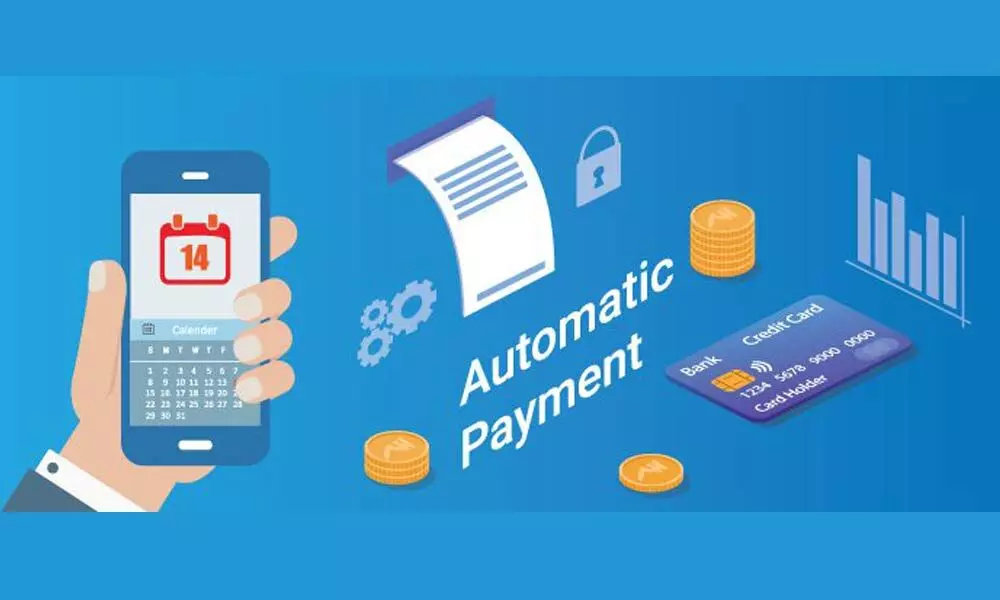Auto debit, not so automatic anymore
With the new regulations, customers will now be required to re-register each of their payment instruments, may it be a debit card, credit card or UPI for a service under the recurring mandate
image for illustrative purpose

- After the re-registration, the first transaction will have to be executed via additional factor authentication (AFA)
- For this, customers need to approve auto-debit request beforehand
- Upto Rs5,000, transactions can be executed seamlessly without AFA
- Transactions above Rs5,000, will require chipping in the OTP every time
Mumbai: According to the Reserve Bank of India's (RBI's) new guidelines, effective from October 1, auto-debit mandates for payments of utility bills, insurance premiums, subscriptions to online services and credit card bills will not go through.
The new RBI guidelines require customers to carry additional factor authentication (AFA) on all recurring payments done through their debit cards, credit cards, UPI and prepaid payments instruments (PPIs). MandarAgashe, Founder, Vice-Chairman and MD, Sarvatra Technologies, says, "the RBI's, decision is a huge leap forward in safeguarding customers' interests, whilst enhancing the security of payments. With the new regulations, customers will now be required to re-register each of their payment instruments then may it be a debit card, credit card or UPI for a service under the recurring mandate."
After the re-registration, the first transaction will have to be executed via additional factor authentication (AFA) by approving the auto-debit request beforehand. While consecutive transactions, for value upto Rs5,000 can be executed seamlessly without AFA, transactions of value above Rs5,000, will require chipping in the OTP every time.
While at the onset, this may impact customer convenience to some extent, it will elevate payment security to new levels.
Most importantly this will give the control back in the hands of the customer whilst driving simplicity and transparency as he can now determine and set the amount and velocity of recurring mandates besides even annulling a service whenever required through web-based solutions offered by the banks. The new regulations will bring in uniformity across services while building a ubiquitous platform within the payment eco-system across recurring mandates.
With the deadline nearing, RBI has mandated all banks to comply with the guidelines and directed issuer banks to notify their customers about the changed rules and what they need to do, besides banks have started intimating customers on the same.
Anand Kumar Bajaj, Founder, MD & CEO, PayNearby says: "Earlier, consumers used to complete their transactions at multiple consumption points for e-commerce or food ordering services. But now with the new regulations being effective from October 1, payment transactions pertaining to recurring payments using cards, will have to be routed through the issuer Bank. Consumers who have completed the registration process advised by RBI will not face any issues on recurring mandates.
While this may seem a little inconvenient from the consumer perspective, it is a welcome move by the Regulator and is in the interest of the consumers."
India is the only country to offer PIN on cards at the POS terminal and OTP for an online transaction, but with rising digital payments vulnerability to cyberattacks and digital frauds has also been rising incrementally.
Therefore, Bajaj said:"Even as we work towards promoting digital payments, it is also important that we strengthen the infrastructure to make it secure. Therefore, now is the best time to infuse regulatory control as it will safeguard customer data and avoid digital frauds, especially in the case of gullible customers who often fall prey to data breaches. Users need to review all their recurring payments and register them with their banks by offering standing instructions to their respective banks. Consumers also need to be aware that the new guidelines will not impact any recurring transactions under UPI, AutoPay and e-NACH.

